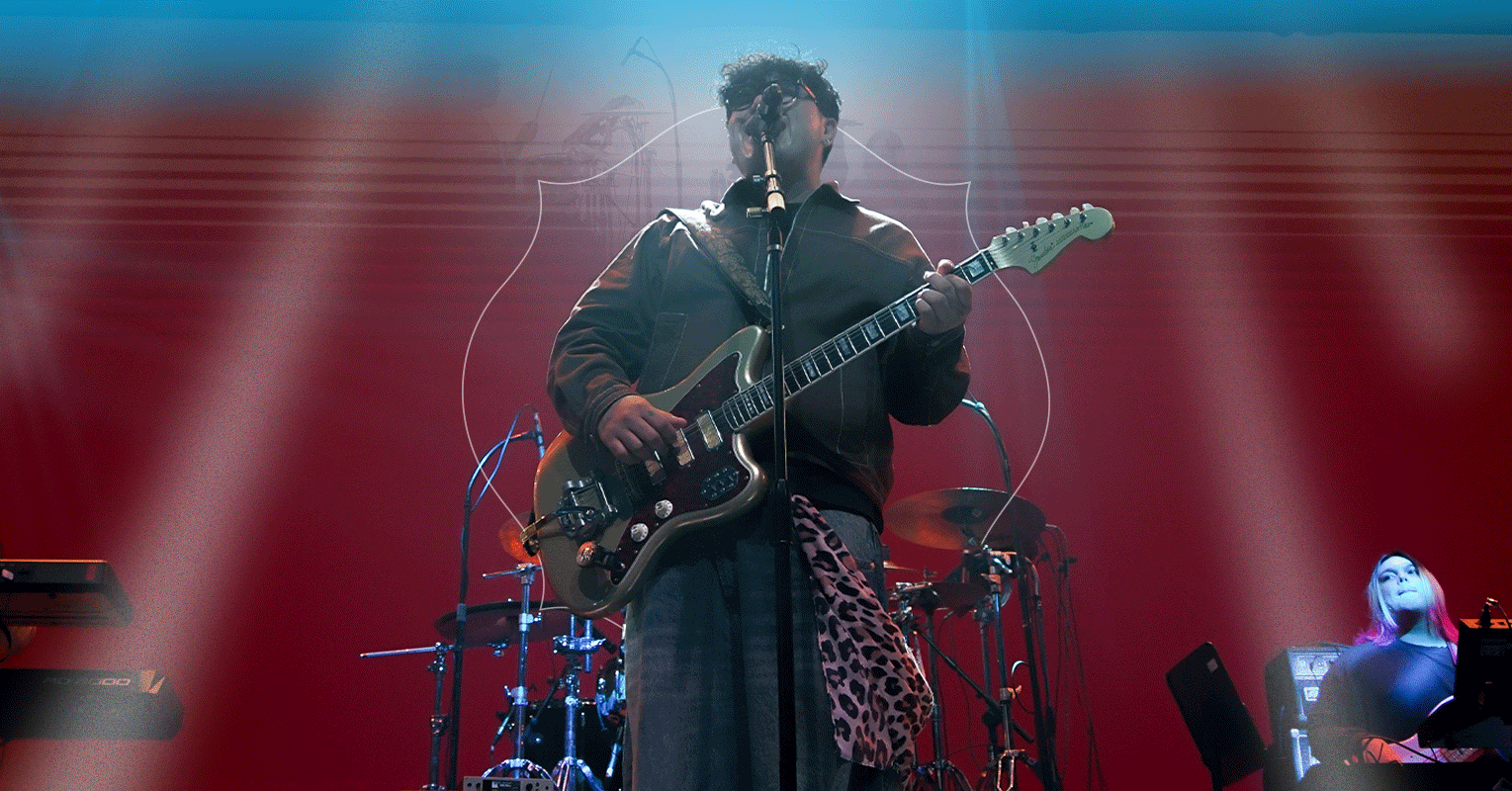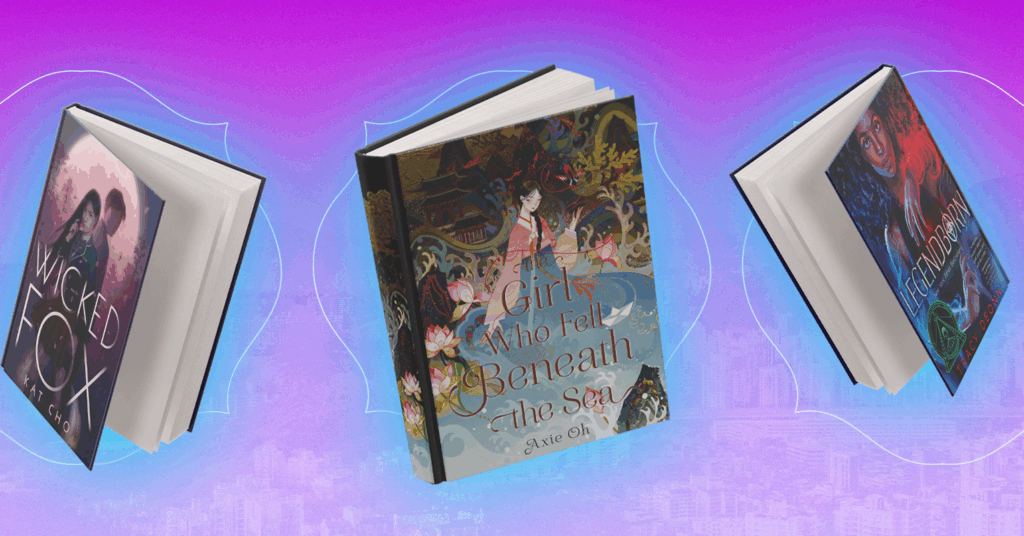‘‘KPop Demon Hunters’’ Shines a Light on the Darkest Parts of Ourselves

Spoiler Warning: This article contains major spoilers for KPop Demon Hunters.
It’s been two weeks and we’re still talking about it. These demon hunters have geared up and dominated the streaming charts even 14 days after the release of Sony Picture Animation’s KPop Demon Hunters on Netflix. Directed by Maggie Kang and Chris Appelhans, the movie has amassed overnight sensation — hitting No. 1 on Netflix’s top movies with its soundtrack becoming the No. 1 most-streamed album on Spotify.
K-pop superstars Rumi (voiced by Arden Cho and sung by EJAE), Mira (voiced by May Hong and sung by Audrey Nuna), and Zoey (voiced by Ji-young Yoo and sung by REI AMI) of HUNTR/X captivate millions with their energetic stage presences. Their songs radiate confidence and have the power to uplift all their fans. In secret, the demon-hunting trio also protects their fans from soul-stealing demons. Their voices and their songs strengthen the protection shield between the human and demon worlds — called the Honmoon.
Just as they think they are close to reaching their goal of creating the Golden Honmoon, which will keep the demons sealed away forever, a demon boy group called the Saja Boys pose a major threat to all. Throughout KPop Demon Hunters, HUNTR/X work hard to defeat their rivals in order to restore the Honmoon but are faced with multiple challenges. With a mix of Korean shamanic roots, life-changing vocals, and the weight of the world on their shoulders, Rumi, Mira, and Zoey work to protect their fans, but at what cost?
Beyond the surface of charming demon boys and demon-hunting K-pop stars lies a much deeper message. The movie highlights the power of vulnerability and self acceptance in healing the shame that’s kept buried within. In this analysis, EnVi takes a closer look at how these themes play a role in shaping the story and characters of KPop Demon Hunters as well as how the film’s record-breaking soundtrack propels the narrative.
The Message Beyond “Demons”
On the surface, viewers can expect to see HUNTR/X fight and banish demons back to the demon world. Taking a deeper dive into the film’s cultural significance, the story is rooted in Korean shamanism, which serves as an integral piece to the plot. The first hunters were “mudang,” women shamans who drove out evil through music and dance. In KPop Demon Hunters, each set of hunters would adapt to the times, landing on the present with HUNTR/X being K-pop stars.
In the KPop Demon Hunters world, demons fall under the control of Gwi Ma, their demon king who thrives on the souls of humans. He seizes power over demons and humans by preying on their deepest securities. Through amplifying their negative thoughts, Gwi Ma fuels their shame which ultimately binds them to him. These demons are the living manifestation of shame left to grow in the darkness without compassion or light to heal it.
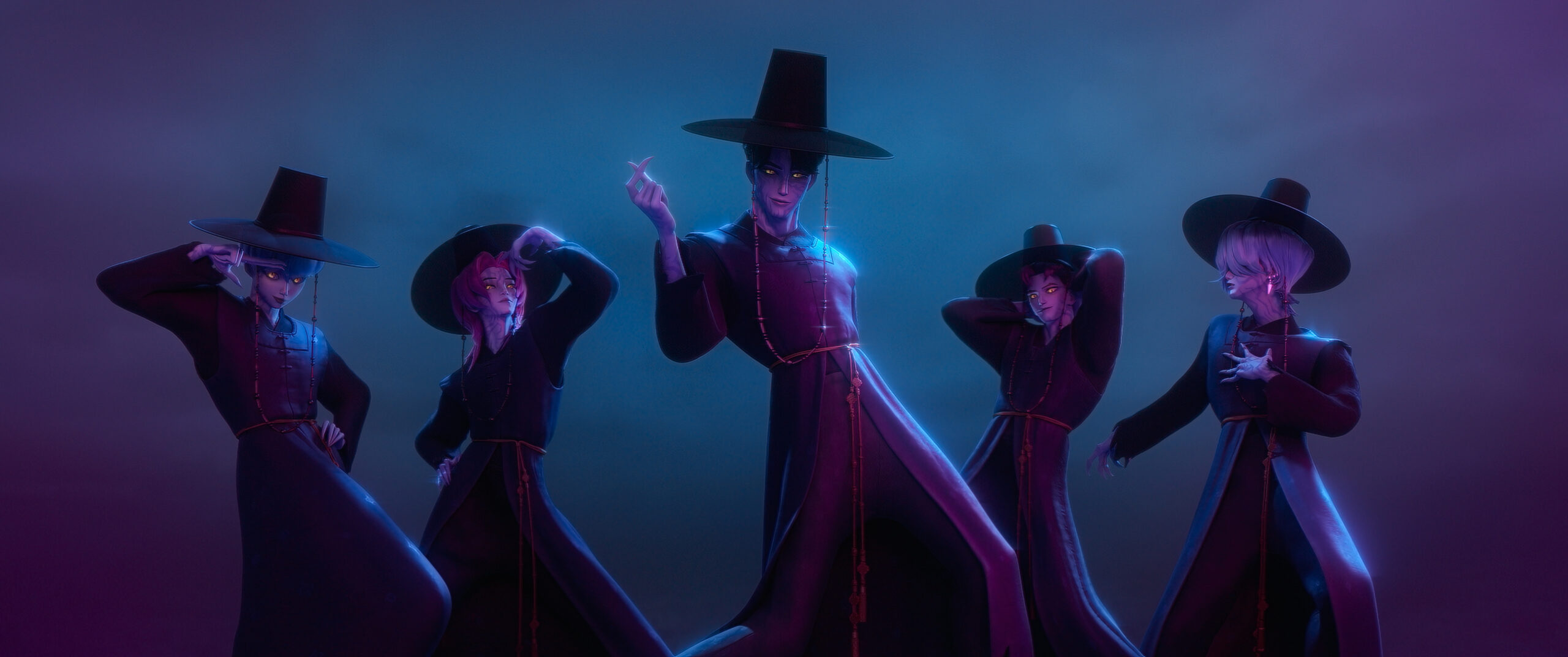
Jinu, the leader of the Saja Boys (voiced by Ahn Hyo-Seop and sung by Andrew Choi), plays a crucial role in showcasing the reigns of Gwi-Ma’s power and how profoundly shame can shape identity. For 400 years he carried the guilt of abandoning his family in pursuit of a better life promised by Gwi-Ma, which resulted in costing Jinu his humanity. As the antagonist, Jinu believes his inner demon’s voice that belittles him and makes a deal with Gwi-Ma to erase his painful memories in return for him taking down HUNTR/X.
In contrast, the hunters were taught that demons needed to be expelled because they are evil through-and-through. Through characters like Celine (former hunter of the Sunlight Sisters), Mira, and Zoey, the audience understand the importance of the Golden Honmoon and how that ties into their mission as hunters. This causes more pressure for the main character Rumi who is half demon, half hunter. Her existence goes against the grain, proving that people aren’t as black and white as they seem. This causes inner turmoil for Rumi as she progressively struggles with her shame throughout the movie.
Shame Silences You
The plot of the film revolves around the theme of shame by portraying three different manifestations: hiding, self-rejection, and denial. From a young age, Celine had instilled in Rumi that she must cover up her patterns and keep her demon side a secret. Her lifelong mantra, “Our faults and fears must never be seen,” seeped into every part of Rumi’s life. As a result, secrecy had become deeply rooted in Rumi, who grew to believe she was wrong and unacceptable. With the words of Celine looming in her head about how Rumi needs to fix herself, it became Rumi’s mission to separate from her demon side. Despite having a strong friendship with Zoey and Mira, she has kept them at a distance by putting up walls and withholding the truth from them. The only way she truly hid her identity was by covering up her marks, which Celine constantly reminds her to do.
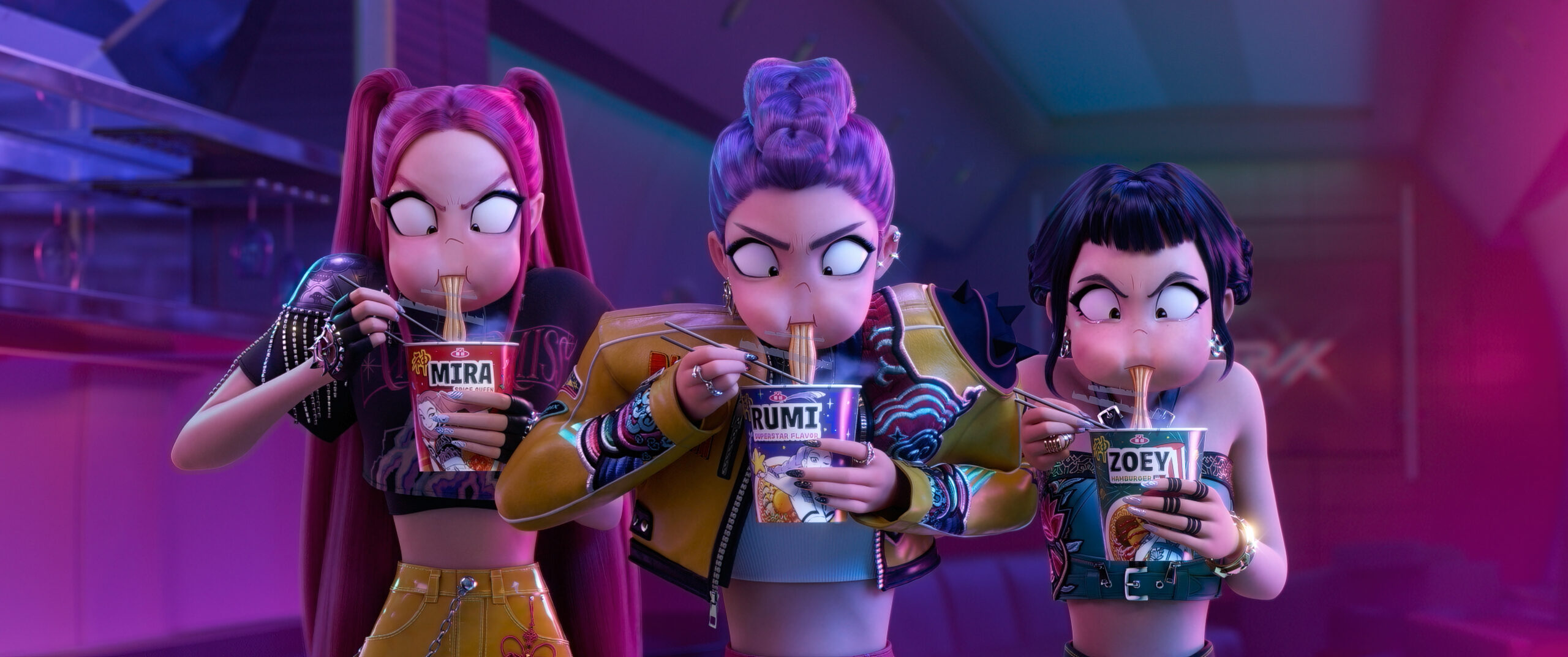
Celine tells Rumi the only way to fix herself is by creating the Golden Honmoon, which will seal away all the demons and make her patterns go away. The pressure dials up quickly as Rumi makes multiple desperate attempts to rid herself of her marks. When Rumi is unable to sing, the girls try to help her heal and even take her to a healer, who turns out to be a sham. These experiences bring her self-rejection to the surface — Rumi is willing to do anything externally to fix and rid herself of the darkness within instead of facing it head on.
With glistening prospects of achieving the Golden Honmoon, Rumi releases HUNTR/X’s new single “Golden.” This empowering track is all about embracing who you’re born to be, delivering a message powerful enough to inspire and reach the hearts of all. The only problem is, Rumi is hiding a big part of who she is. Stepping away from the flashing lights, Rumi alone in her dressing room pulls down her jacket to reveal her purple demon patterns. Continuing to live artificially and in shame of her identity starts to cost Rumi not only mentally, but physically. She realizes she has lost the one thing that gave her purpose, her voice.
As the movie progresses, the girls believe writing a song to beat The Saja Boys will help them win their fans back. “Takedown” is a diss to all demons — filled with hateful lyrics like “When your patterns start to show / It makes the hatrеd wanna grow outta my veins” and “A demon with no feelings don’t deserve to live, it’s so obvious.” Working on this song further fuels the hatred for demons that Zoey and Mira project. Despite Rumi agreeing with the intention of banishing demons, her complex feelings continue to grow. Everything about the lyrics are contradictory to who she is, being half demon yet standing in the light of good as a hunter. Rumi lives in a state of denial and rejects the thought of her being anything like the demons she seeks to expel.
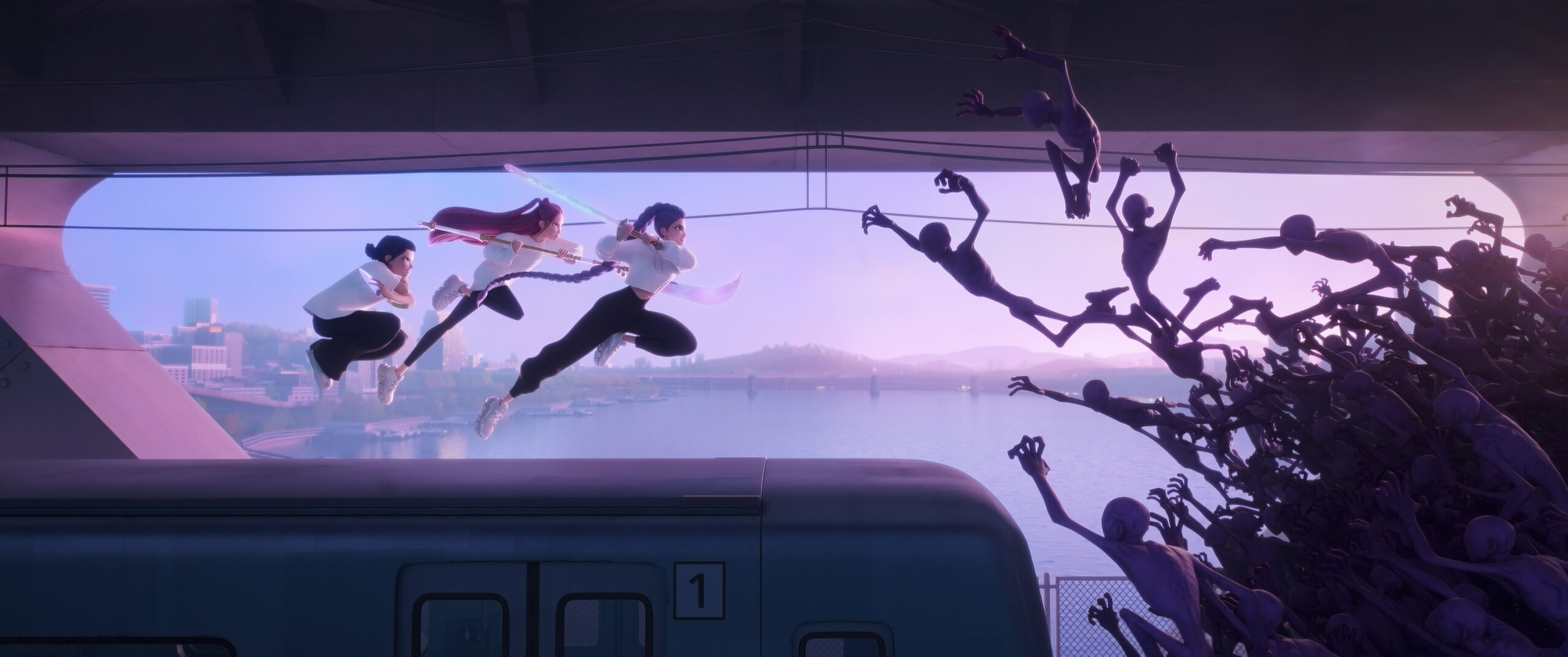
Vulnerability Sets You Free
As Rumi continues to struggle between keeping her secret and facing her truth, she grows a connection with Jinu. He is the first to see her patterns and covers them during a fight scene before Mira and Zoey noticed. Since that moment, Jinu and Rumi have seen parts of each other that were closed off to the rest of the world.
Rumi is finally able to open up to Jinu. Their heartfelt duet “Free” echoes words of optimism, recognition, and freedom. They both emulate hope as Rumi breathes life into Jinu and sees him as a good person while Jinu understands her shame. “Free” is about breaking down the walls and being free to be vulnerable with someone. “We can’t fix it if we never face it,” the two sing together, finding hints of courage to move towards a new beginning past their darkness.
The two mirror the two sides of shame — being able to see it for what it is but also not letting it define them. They teach each other about accepting the dark parts of themselves and seeing a chance to free themselves. This seems to work as they are seen free of their marks and the voices at the end of their song. Rumi and Jinu’s undeniable chemistry and connection highlight the emotional truth that vulnerability with someone who accepts you can set you free.
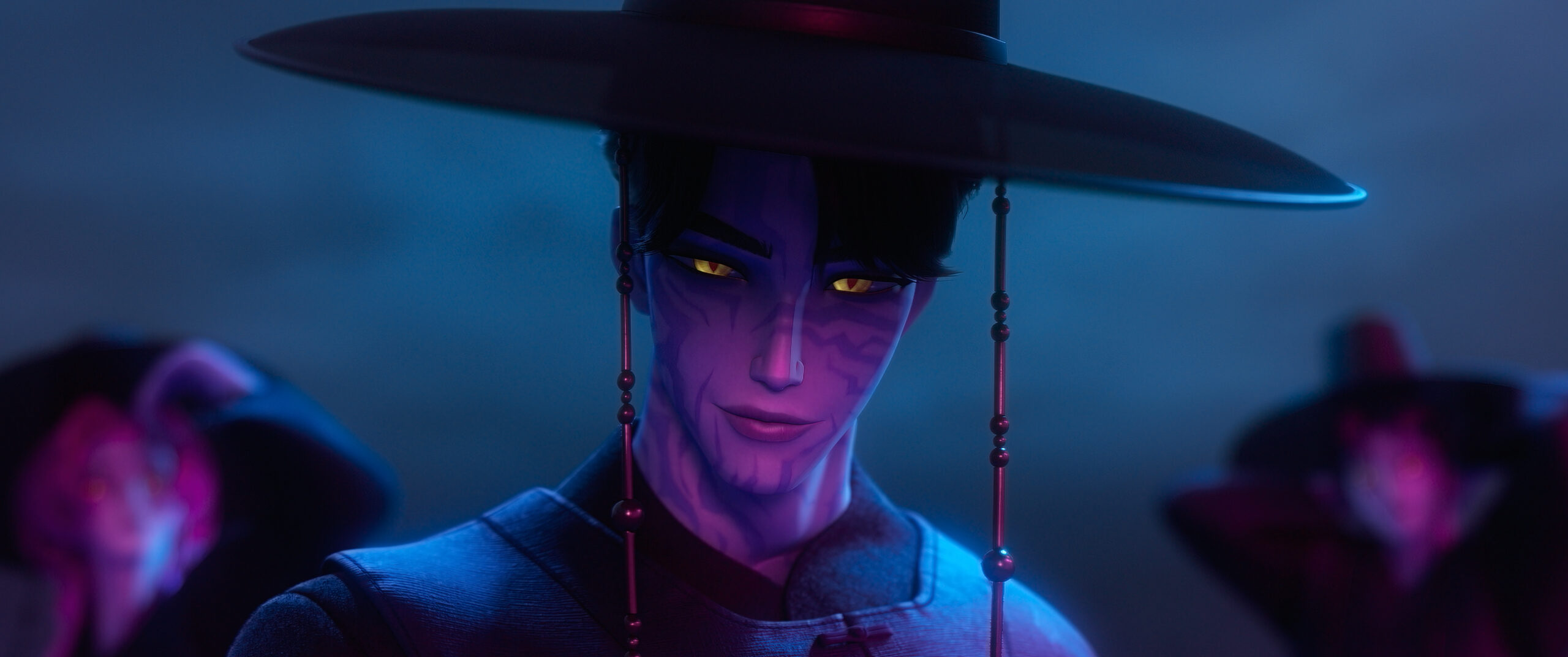
Zoey and Mira eventually reveal their own vulnerabilities when the trio sit together to talk about “Takedown” and the Idol Awards. Mira reveals how her personality was a problem her whole life, but with HUNTR/X, she feels accepted. For Zoey, she feels as though she was too much and that her lyrics and thoughts were too weird. She came to realize they do mean something when being with them. Rumi is the only one in this moment who does not share her own fears which reflects on her unwavering goal. Once the Honmoon is sealed, she won’t have to worry about her secret getting out.
Self-Acceptance Is Your Superpower
The Idol Awards, the biggest K-pop event of the year in the movie, marks the day the girls plan to create the Golden Honmoon. They are close to achieving it when Rumi nails her verses in the “Golden” performance, but then a diversion created by the demons comes into play. “Takedown” unexpectedly starts to play while demons disguised as Zoey and Mira appear. As these shapeshifting demons poke and prod at Rumi’s shame, they pull her jacket off, exposing her patterns on stage. She starts to unravel out of fear. In the wake of the aftermath, the real Zoey and Mira are in disbelief and apprehensively wield their weapons toward her. This scene is followed by moments of Jinu betraying Rumi and Celine further perpetrating the narrative of Rumi having to hide her patterns.
In these moments, Rumi’s fears of being unaccepted and abandoned fester along with the glow of her deep, magenta patterns. When Celine is unable to truly look at and accept Rumi, it is the final piece where Rumi knows she cannot hide anymore. Rumi’s shame had grown to cause ruptures in the Honmoon until the climax of the movie where she has no other choice but to own both sides of her identity.
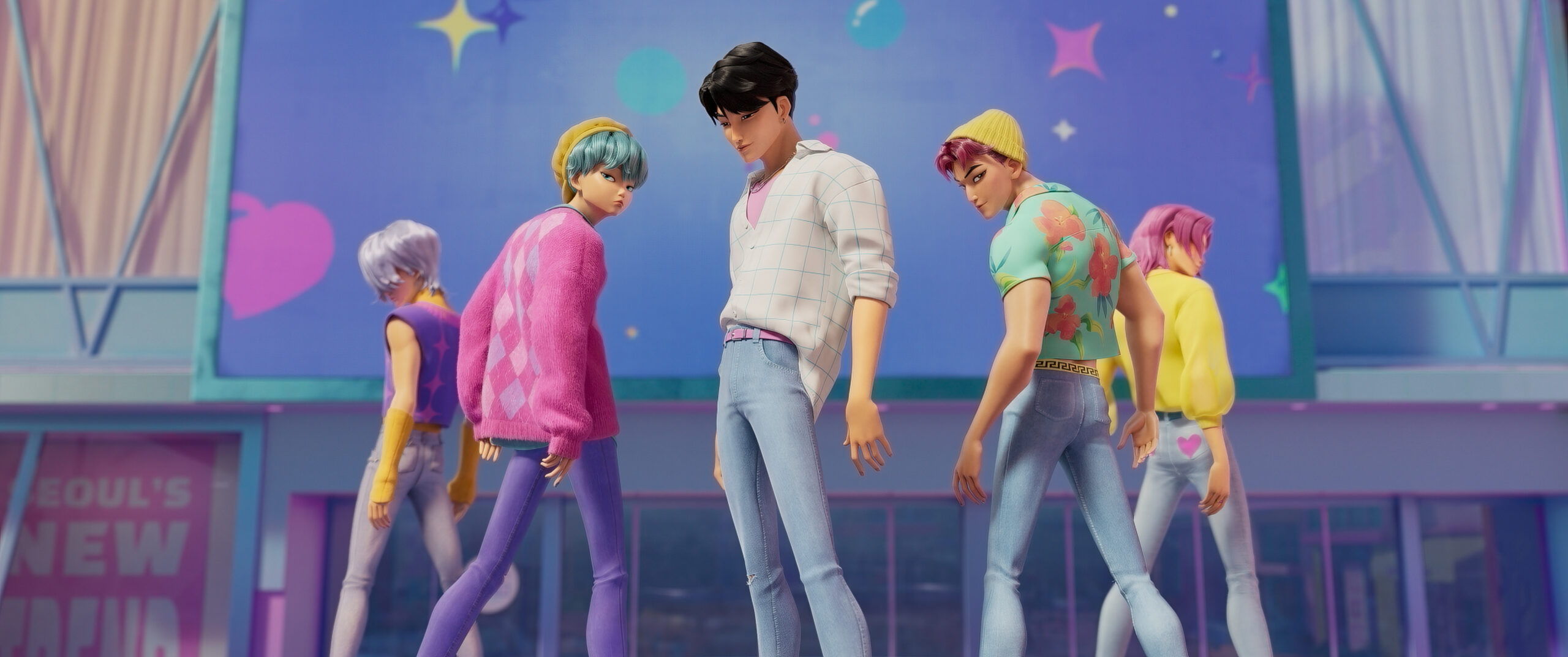
Rumi’s rise to self-acceptance shines when she makes a dramatic appearance that disrupts the Saja Boys’ mass plan of luring people to Gwi-Ma and begins to sing her truth. “What It Sounds Like” resonates as a powerful anthem of self-acceptance that tears the crowd away from the lure of the Saja Boys. Rumi admits her faults in being ashamed of her true self and trying to fix it instead of accepting her identity. “My voice without the lies, this is what it sounds like,” Rumi sings, finding strength in her truth and becoming unshakeable.
Rumi’s voice wakes Zoey and Mira from their shame-induced daze, and they both realize they’ve been hiding their own shame of feeling too much or too weird. HUNTR/X rise from the ashes of what wasn’t working and step into a new era that embraces both the darkness and the light. By knowing who they are and accepting themselves, especially Rumi, they are able to defeat Gwi-Ma, wake their fans up, and create a new Rainbow Honmoon.
Jinu’s self-sacrifice during the segment is seen to give Rumi the last bit of strength and confidence to defeat Gwi-Ma. As Jinu tells Rumi that she restored his soul, which he gives right back to her, it was the last message of hope and love — a testament to the humanity and goodness they saw each other until the very end.
No More Hiding, We’re Shining
Self-acceptance radiates as Rumi’s once-dark patterns transform into iridescent rainbow colors. By finding a way to hone in her powers using both her demon and hunter identities, she created a new path ahead for HUNTR/X. KPop Demon Hunters is filled with valuable lessons that can resonate deeply with viewers. Once you embrace your authentic, unfiltered self, it becomes your greatest superpower. By coming to terms with who she truly is, Rumi reclaims her voice even stronger than before. The end of the movie shows her finally being able to wear regular short sleeve shirts instead of covering up and even spending a long awaited day at the bathhouse with Zoey and Mira. She does not need to hide anymore.
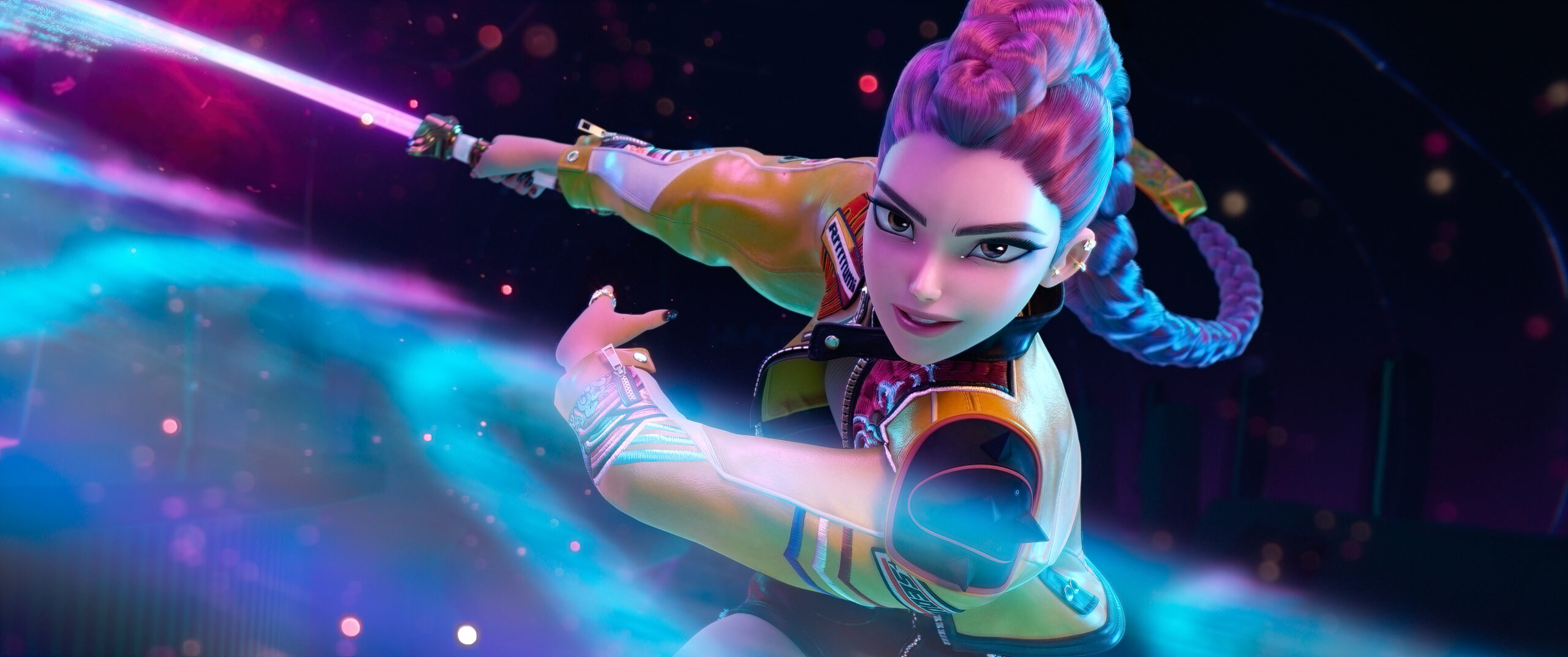
Rumi’s journey of acceptance reinforces that true healing begins by turning inward and facing our shadows with love, not trying to fix what isn’t broken. As she sings in “Golden,” “I’m done hidin’… Our time, no fears, no lies / That’s who we’re born to be,” finally living up to her words. This transformation highlights a significant lesson as Rumi breaks out of the perfectionistic mold that had been bestowed on her and carves a new path forward.
Millions of viewers, both K-pop fans and non K-pop fans, have resonated deeply with the movie. The creators of Kpop Demon Hunters gave it their all, paying careful attention to incorporating a plethora of details that contribute to the film’s meaning and impact. The soundtrack, through its intentional lyricism and production, aligns with the movie’s purpose and creates an impactful touch on the emotions of any viewer. KPop Demon Hunters is not just about the musical numbers and demons, it also serves as a love letter to acceptance. This is for the people pleasers, the black sheep, and the ones who want to project their voice into the world — don’t deny your true self and remember to shine bright like who you were born to be.
Kpop Demon Hunters is available for streaming on Netflix.
Still can’t get enough of Kpop Demon Hunters? Check out our book recommendations that will help fill the void of this fantastical movie here!

